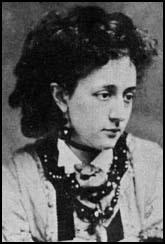Lola Montez

Eliza Gilbert, the daughter of an army officer and a Spanish woman, was born in County Sligo, Ireland, on 17th February, 1821. She spent some of her childhood in India but after her father died of cholera the rest of the family moved to Scotland.
In 1832 Eliza was sent to boarding school in Bath. At the age of 16 she eloped with Lieutenant Thomas James. The marriage was not a success and the couple separated five years later. In 1843 Eliza adopted the name Lola Montez and launched a career as a dancer.
Over the next few years Lola Montez worked throughout Europe as a dancer and is believed to have had relationships with the novelist, Alexander Dumas, and the composer, Franz Lizst. After appearing in Munich in 1846 she became the mistress of Ludwig of Bavaria. The following year she was granted the title the Countess of Landsfeld. It was during this time that the expression, "Whatever Lola wants, Lola gets", entered the English language.
In 1848 the Bavarians rose up against their ruler and Ludwig was forced to abdicate. Lola Montez fled the country and emigrated to the United States. Montez married Patrick Hull and with the help of her new husband decided to revive her career as an actress and dancer. In May 1853 she appeared in her own play, Lolo Montez in Bavaria, in San Francisco. The play created a sensation and the the reviewer in the Alta California praised her "peculiar earnestness of manner and utterance, her depth of feeling and power to display the passions of an ardent and high-souled woman."
Montez's performance in Spider Dance was less successful. While in Sacramento she paused in the middle of her performance and lectured the audience on their poor manners. One critic pointed out that this developed into a "torrent of abuse and profanity". After receiving a poor review in the Daily California she challenged the editor to a duel. .

Hurt by these comments in the press Montez decided to retire from the stage and purchased a cottage in Grass Valley. This was close to a mining camp that had been established during the Californian Gold Rush. Retirement did not last for long and she was soon performing for local miners. She received good reviews in the Grass Valley Telegraph, but as one critic pointed out, the editor, Henry Shipley, "had not exactly the run of the house on Mill Street, he had at least the privileges of the front door." However, Shipley eventually fell out with Montez and wrote a satirical piece about the two having a duel with "horse-whips, nails and tongue" at the Golden Gate Saloon.
In June 1855 Lola Montez sailed for Australia. After a two year tour she returned to the United States. Later she moved to New York where she became an active member of the Episcopal Church.
Lola Montez died of pneumonia on 17th January, 1861.
Primary Sources
(1) Lola Montez wrote a letter to the editor of the Daily California complaining about the review the newspaper published about her performance in Spider Dance (July, 1853)
After such a gross insult you must don petticoats. I have brought some with me which I can lend you for the occasion. I leave the choice of weapons with you, for I am very magnanimous. You may choose between my duelling pistols or take your choice of a pill out of a pill box. One shall be poison and the other not and the chances are even.
(2) Grass Valley Telegraph (22nd November, 1854)
First Round: Countess pitching in, strikes blow with whip. Shipley catches it - both close. Countess's second takes her off. Shipley falls back with whip in his possession.
Second Round: Countess returns to attack - with her tongue. Shipley, provokingly cool, smokes his pipe and laughs at her.
Third Round: Countess, urged to desperation, strikes at Shipley and spits in his face. Shipley magnanimously advises her not to go too far.
Fourth Round: Countess tries on her old tactics - appeals to crowd. Crowd sensibly laughs at her.
Fifth Round: Crowd greatly amused.
Sixth Round: Cries of 'Speech from Shipley.' Shipley offers the stump to Lola. Countess informed Shipley that her name is 'Mad Lola.'
Seventh Round: Countess reads extracts from Grass Valley Telegraph, counts number of words and informs Shipley that there are twenty words to be accounted for.
Eighth Round: Shipley remarks that crowd has been sufficiently amused and concludes to retire in disgust.
(3) Lola Montez, Nevada Journal (23rd November, 1854)
He (Henry Shipley) regardless of my sufferings, being in bed, a lady being present, threatens to cut my throat before he was done with me, using such language which I shall not disgrace my pen to repeat. I got up, took my pistol and told him to leave the house. He, still using to me the most offensive language, concluded to go. I told him that if he ever crossed the door of my dwelling, I should consider him in the light of a house-breaker and treat him accordingly. He left at last saying he would cut my throat. In my hurry to get him out of the house I helped him either with my hand or foot (in the hurry I forgot which).

